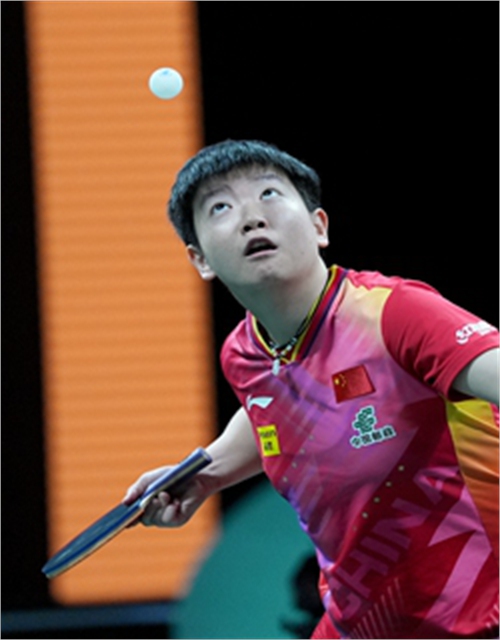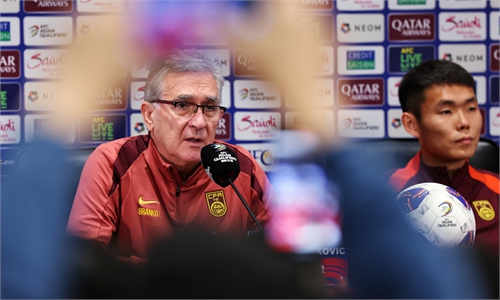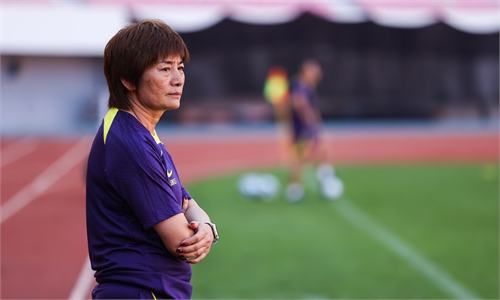SPORT / MISCELLANY
Chinese football eyes tight schedule for competitions in 2025
Gearing up for new opportunities
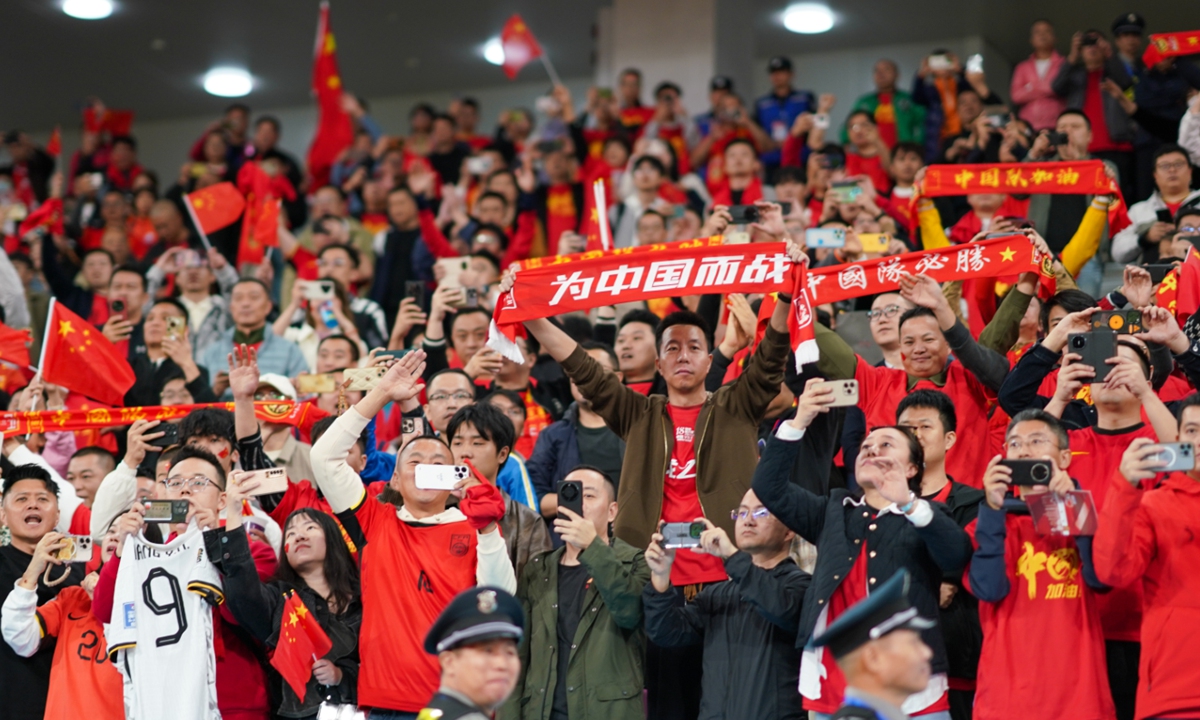
Chinese fans cheer for the team during their World Cup qualifier against Japan on November 19, 2024 in Xiamen, Fujian Province. Photo: VCG
The Chinese men's national football team has started its preparation for the remaining 2026 World Cup Asian qualifiers this year as they gathered for a winter training session in Haikou, South China's Hainan Province on Wednesday.The Chinese national football teams are charging forward with renewed focus and determination in 2025, embarking on critical campaigns across various levels. While the men's senior team is preparing for the World Cup qualifiers, youth teams are targeting continental success.
As the domestic Chinese Super League (CSL) concluded its 2024 season in November and is set to resume in late February, followed by two World Cup Asian qualifiers in March, this January camp is a crucial opportunity for the players to address weaknesses and refine tactical cohesion such as set-piece strategies after their inconsistent performances in the series in 2024.
Although China currently trails at the bottom in the six-team qualifying group, the team remains only one point behind second-placed team Australia. China will play against Saudi Arabia on an away pitch on March 20 before hosting Australia on March 25.
A strong showing in the next two qualifying matches is expected to boost morale and lay the foundation for further progress, football commentators told the Global Times.
"The team's morale is high thanks to the late consecutive victories over Indonesia and Bahrain in the qualifiers," Ma Dexing, a Beijing-based football commentator, told the Global Times.
"Regardless of whether the Chinese team can finally qualify for the World Cup, playing more international games this year is of great help to improve the competitive level of the national team."
The Chinese national team head coach Branko Ivankovic has emphasized the importance of the camp for integrating new players and solidifying the team's strategic approach, an official with the national team told the Global Times.
Notable call-ups include naturalized player Hou Yongyong playing in the Norwegian league and forward Wu Shaocong in the Polish league, both benefiting from their respective overseas league's off-seasons.
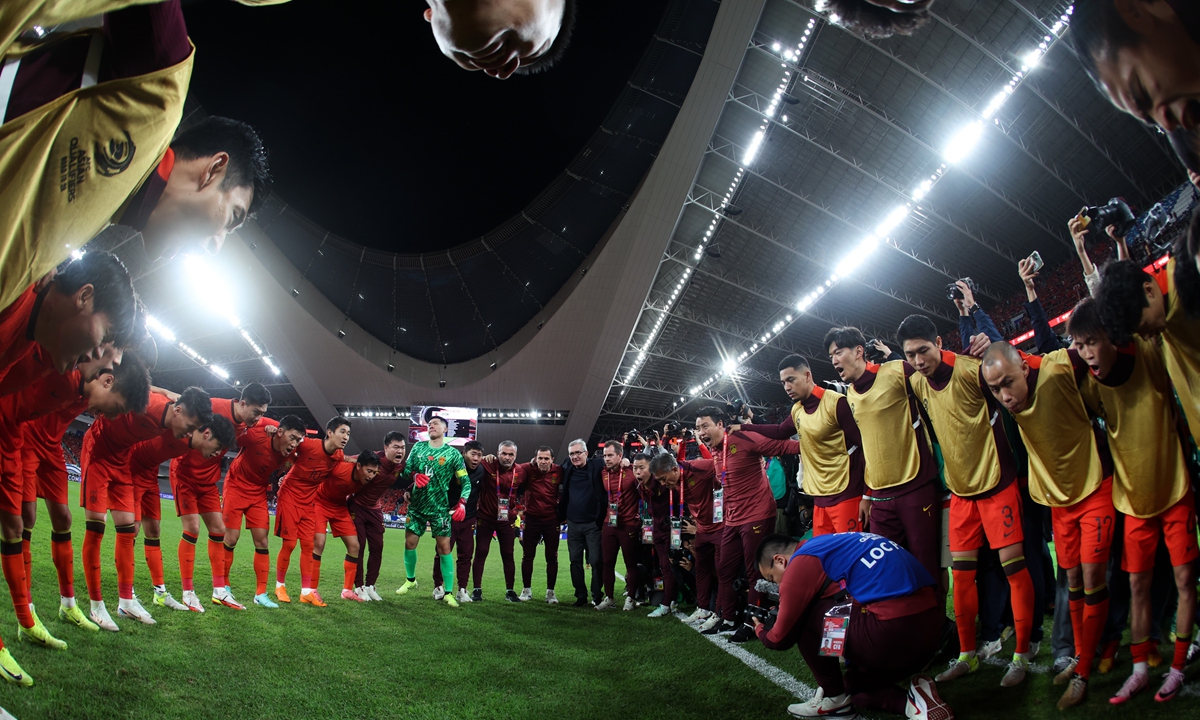
Chinese national football team players gather in a circle to cheer each other on before their World Cup qualifier against Japan on November 19, 2024 in Xiamen, Fujian Province. Photo: VCG
Additionally, goalkeepers Jian Tao and Han Jiaqi, recognized for his consistency in performance in the CSL after the national team faced an aging keeper squad, are included in the January training camp.
"The January training session could help the national team players become more familiar with the tactics with each other as it enables several of the new players to blend in," Zhang Bin, a Beijing-based sports commentator, told the Global Times.
"The subsequent World Cup qualifying matches are highly likely to be more intense as every team will vie for the berths in the last ditch, which may led to players suspension due to injuries and even yellow cards. If that happens, new players need to be ready to step in, thus making the training session an opportunity to strengthen mutual understanding among the national team players," Zhang said.
The Chinese women's national team faces a quieter competitive schedule in 2025, with only the EAFF Women's East Asian Cup offering an international test.
In 2024, the team played just five international friendlies since head coach Ante Milicic taking charge in May 2024.
Emerging talents like winger Huo Yuexin are generating hopes for revitalizing the team.
Eyes on the youth World Cup
The U20 men's national team is preparing to host the AFC U20 Asian Cup in Shenzhen, South China's Guangdong Province this February, aiming to secure a top-four finish and qualify for the FIFA U20 World Cup later this year.
Since January 6, the team has been training intensively under head coach Dejan Durdevic, who has a proven track record in nurturing young talent.
Fans have pinned their expectations on the duo from Xinjiang: winger Afrden Asqer, whose speed and agility make him a constant threat on counterattacks, and midfielder Mutellip Iminqari, a composed playmaker who dictates the team's tempo.
The team has honed its skills through extensive preparation, including 14 international friendlies over the last year against strong opponents such as Iran, Australia, and Saudi Arabia. This robust schedule has helped identify promising talents like Wang Yudong and Liu Chengyu, who are expected to play pivotal roles.
With home-field advantage and an enthusiastic local crowd, the U20 team is determined to break a 20-year drought by securing a place in the FIFA U20 World Cup, when the 2005 Chinese squad qualified into the last 16 in a 24-team tournament.
The U17 national team is also gearing up for the AFC U17 Asian Cup in April in Saudi Arabia. A top eight finish at the event will make the team qualify for the FIFA U17 World Cup for the first time.
A unified domestic youth calendar
One of the most significant changes domestically this year is the implementation of a unified national calendar for youth competitions, covering age groups from under-13 to 18 for boys and under-14 to 18 for girls.
This reform, which addresses long-standing issues of scheduling conflicts and uneven competition quality, has been widely applauded by industry practitioners.
"By streamlining tournaments and optimizing resources such as venues and referees, the new system could provide young players with consistent, high-quality development opportunities," Zhang noted.
"The calendar ensures that clubs and academies can plan more effectively, eliminating last-minute changes that previously disrupted team preparations. This systematic approach is expected to yield long-term benefits by fostering a stable pipeline of talent for the national teams."
